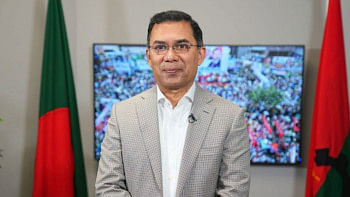Lest we forget: Mohan Mia: An exemplary politician

Yusuf Ali Choudhury, popularly known as Mohan Mia, who passed away on November 26, 1971, was a very influential politician of the then East Pakistan but preferred always to keep away from limelight. To him principles and services to people were more important that power and wealth. He proved it over a considerable period of active political life.
Mohan Mia was born in an aristocratic zamidar family of Faridpur and became well known for philanthropy and promotion of education among the Muslims who suffered many disadvantages due to their backwardness. Among many educational institutions be founded were Moizuddin High School, Halima Students Home and Halima Girls School to commemorate his parents. The Student Home, created in 1926, was a unique boarding house in which meritorious students enjoyed free residence under the care and supervision of a reputed teacher.
In 1945 he set up Baitul Aman on the outskirts of Faridpur town. For this multipurpose agricultural, industrial and educational project Mohan Mia and his two brothers, Moazzem Husain Chowdhury (Lal Mia) and Enayet Hussain Chowdhury (Tara Mia) donated 500 bighas of land. The primary purpose of this pioneering project has been to train up students in technology and craft to stand on their own feet and set examples of self-supportive initiatives in income generation and social welfare.
He demonstrated similar vision and initiative as a distinguished chairman of the Faridpur district board for fifteen years. He initiated many endeavours to promote education, facilitate communication and provide health services to people. The people of greater Faridpur remember him as an exemplary human being always ready to spend money from his recourse to advance a good cause of public welfare.
He was a very accessible and amiable person and never hesitated to help the needy. In fact, his open-handedness in supporting worthy political and social causes at times put him in financial crisis. In running his zamidar he was most humane to the tenants and broke the tradition of other zamindars by allowing them to approach him as a respected person. He was a democrat per se and never discriminated against people on social or religious grounds. In 1940 he succeeded in keeping Faridpur free from communal disharmony although the rest of British India suffered the worst kind of communal violence. Both Hindus and Muslims admired him for this non-communal attitude.
Mohan Mia entered national politics under the leadership of Sher-e-Bangla A K Fazlul Huq as a member of the Krishak Praja Party. Following the election of 1937 Fazlul Huq formed the government in Bengali in coalition with the Muslim League. But when in 1941 Fazlul Huq severed its ties with the Muslim League Mohan Mia stayed on in the league and was the general secretary of the Faridpur Muslim League from 1940 to 1957. He left the party forever when he found that its high command did not support the popular demand of the people for an honourable place for Bangla as a State Language of Pakistan. He also fought vigorously to secure the rights of the people of East Pakistan. Mohan Mia did not see the formal birth of Bangladesh but the intensity of the liberation war convinced him beyond doubt that the emergence of an independent state was imminent. This was so especially after his ceaseless efforts failed to arrange transfer of power to the majority party of Bangabandhu Sheikh Mujibur Rahman's Awami League following its landslide victory in the 1970 election. It became clear to him that the military rulers of Pakistan were prepared to dismember their country rather than share power with the majority people of the eastern wing.


 For all latest news, follow The Daily Star's Google News channel.
For all latest news, follow The Daily Star's Google News channel. 



Comments